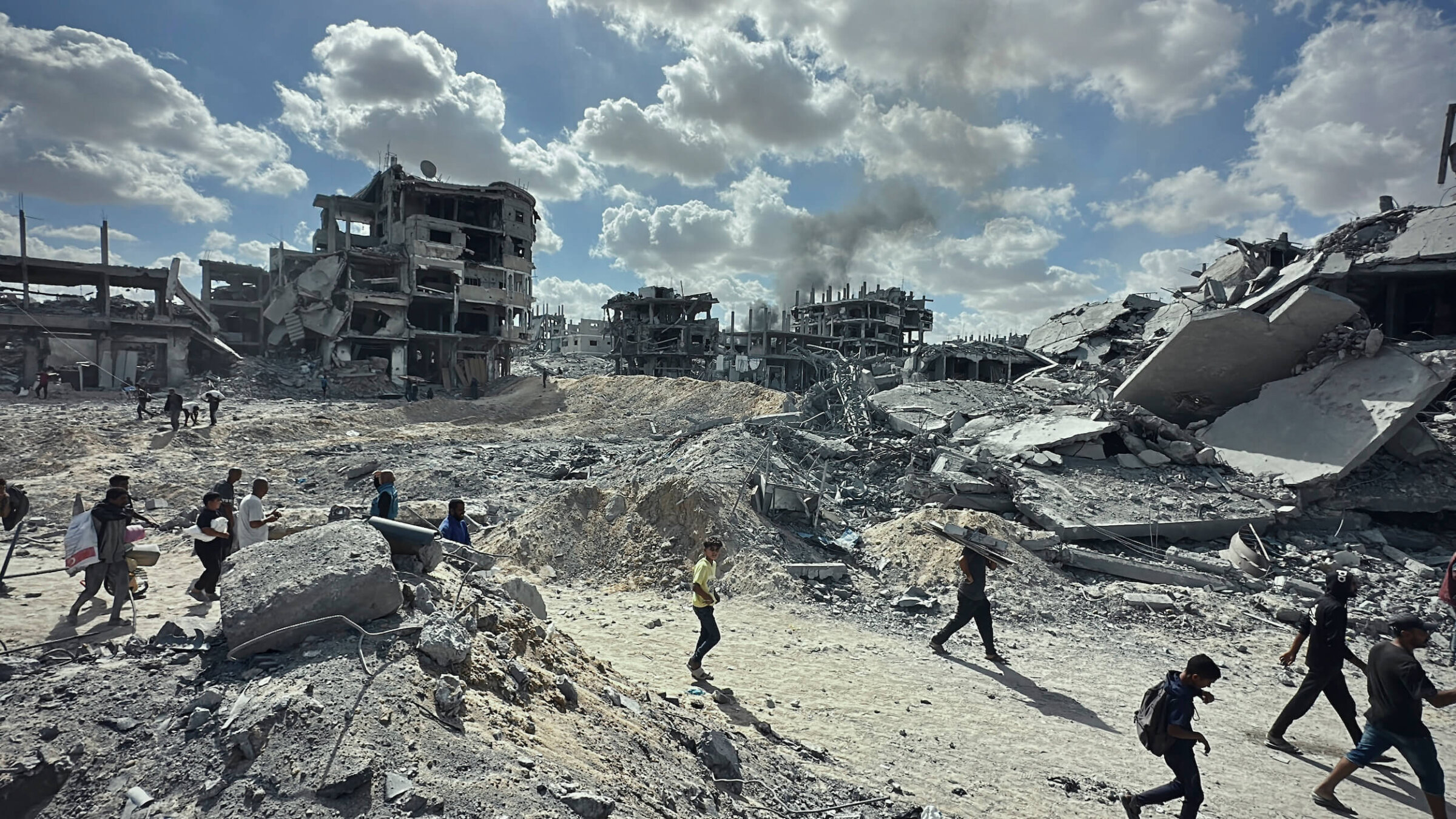I know exactly why leftists aren’t celebrating this ceasefire
Relief that the fighting may be at an end is one thing. Joy — after all this suffering — is another

Palestinians walk among the rubble of destroyed buildings in Khan Yunis, in the southern Gaza Strip, on Oct. 10. Photo by Doaa Albaz/Middle East Images via AFP
“We can’t hear you, Zohran,” read one New York Post headline this week: “Pro-Hamas crowd goes quiet on Trump’s Gaza peace deal.”
“It seems awfully curious that the people who have made Gazans a central political cause do not seem at all relieved that there’s at least a temporary cessation of violence … Why aren’t there widespread celebrations across Western cities and college campuses today?” the article asked.
The Post wasn’t alone in voicing that question. A spokesperson for the Republican Jewish Coalition posted on X that “The silence from the ‘ceasefire now’ crowd is shameful and deafening.” Others went so far as to imply that the protesters had been lying and never actually wanted a ceasefire — because what they really wanted wasn’t freedom and security for Palestinians, but the ability to blame Israel. If pro-Palestinian voices had really wanted a ceasefire, the thinking went, they would be celebrating.
I read these various posts and articles and thought of Rania Abu Anza.
I have thought of her every day since I first read her story in early March 2024. Anza spent a decade trying to have a child through in vitro fertilization. When her twins, a boy and a girl, were five months old, an Israeli strike killed them. It also killed her husband and 11 other members of her family.
A year and a half later, a ceasefire cannot bring her children, her husband, or her 11 family members back. They were killed. They will stay dead. What is there to celebrate?
This does not mean that the ceasefire is not welcome, or that it is not a relief. On the contrary: It is both. Of course it’s a relief that the families of hostages don’t need to live one more day in torment and anguish. Of course it’s a relief that more bombs will not fall on Gaza.
But celebration implies, to me anyway, that this is a positive without caveats. And in this situation, there are so many caveats.
The families of the surviving hostages will still have spent years apart from their loved ones, in no small part because their own government did not treat the hostages’ return as the single highest priority. The families of those hostages who were killed in the war will never again sit down to dinner with their loved ones, who could have been saved. And it is difficult to fathom what’s been taken from the hostages themselves: time spent out exploring the world, or with family and friends, or at home doing nothing much at all but sitting safely in quiet contemplation.
And a ceasefire alone will not heal Israeli society, or return trust to the people in their government. It will not fix some of the deep societal problems this war uncovered. A Chatham House report this August found that: “Israeli television ignores the suffering of Palestinians in Gaza, while the rhetoric is often aggressive. Critical voices, from inside Israel or abroad, are attacked or silenced.” If the country is ever going to find its way back from Oct. 7 and this war, a ceasefire is a necessary precondition, but not a route in and of itself.
In Gaza, Palestinian health authorities have said that about 67,000 people — not distinguishing between combatants and civilians — have been killed by Israel’s campaign in response to Oct. 7. A full third of those killed were under the age of 18. The ceasefire cannot bring those children back to life.
It cannot turn back time and make it such that Israel admitted more than minimal aid to the embattled strip. It will not undo the damage that has been done to the people of Gaza who were denied enough to eat and drink and proper medical care. It will not give children back their parents, or parents back their children. It will not heal the disabled, or make it so that they were never wounded.
It will not change that all of this happened with the backing of the United States government. (This is to say nothing of the West Bank, which has seen a dramatic expansion of Israeli settlements and escalation of settler violence over the course of the war). And as American Jewish groups put out statements cheering the ceasefire, we should also remember that it does not reverse the reality that too many American Jews were cheerleaders for all this death.
Protesters calling for a ceasefire have regularly been denounced as hateful toward Jews or callous toward the plight of Israelis; American Jews who called for one were called somehow un-Jewish. (Yes, some pro-Palestinian protesters also shared hate toward Jews; the much greater majority did not.) The charge of antisemitism — toward those calling for a ceasefire, those calling for a free Palestine, and those who called attention to Israel’s abuses during this war — was used to silence criticism of Israel and of U.S. foreign policy. Some American Jews went so far as to call for the deportation of students protesting the war.
A ceasefire doesn’t change any of that. It can’t.
I have hopes for this ceasefire. At best, it will allow people — Israelis and Palestinians and, yes, diaspora Jews — to chart a new, better course going forward. But it almost certainly will not do that if we delude ourselves into thinking of this as a victory or a kind of tabula rasa, as though the lives lost and hate spewed are all behind us, forgotten, atoned for. The last two years will never not have happened. What happens next depends on all of us fully appreciating that.

















